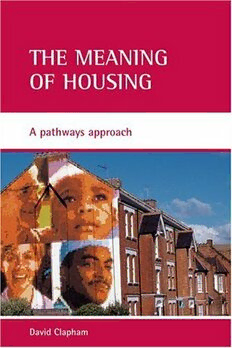
The Meaning Of Housing: A Pathways Approach PDF
296 Pages·2005·1.449 MB·English
Most books are stored in the elastic cloud where traffic is expensive. For this reason, we have a limit on daily download.
Preview The Meaning Of Housing: A Pathways Approach
Description:
This book offers a fresh new approach to the study of housing. Most current approaches tend to ignore or downplay the perceptions and attitudes of individuals in the production and consumption of housing. This book explores the meaning that housing has for individuals and households by examining 'housing pathways'. Although drawing on British experiences, the methodology and theoretical framework used are applicable to the study of housing in any national context. Housing pathways refer to the varying household forms that individuals experience and the housing routes that they take over time. The book argues that housing has increasingly become a means to an end rather than an end in itself. The end is personal fulfilment and the main task of housing research is to elucidate the links. In this pursuit, the concepts of identity and lifestyle are key. Specifically, the book: examines the structure and functioning of households and links this to changing discourses of the family; explores the important interconnections between housing and employment; considers the relationship between people and the physical aspects of a house and its location; looks at housing in terms of lifestyle choice from youth to old age; discusses the implications of the pathways approach for housing policy and future research in the field. The meaning of housing is recommended to anyone researching and studying housing and particularly to those wishing to engage with the new research agenda set out here.
See more
The list of books you might like
Most books are stored in the elastic cloud where traffic is expensive. For this reason, we have a limit on daily download.
